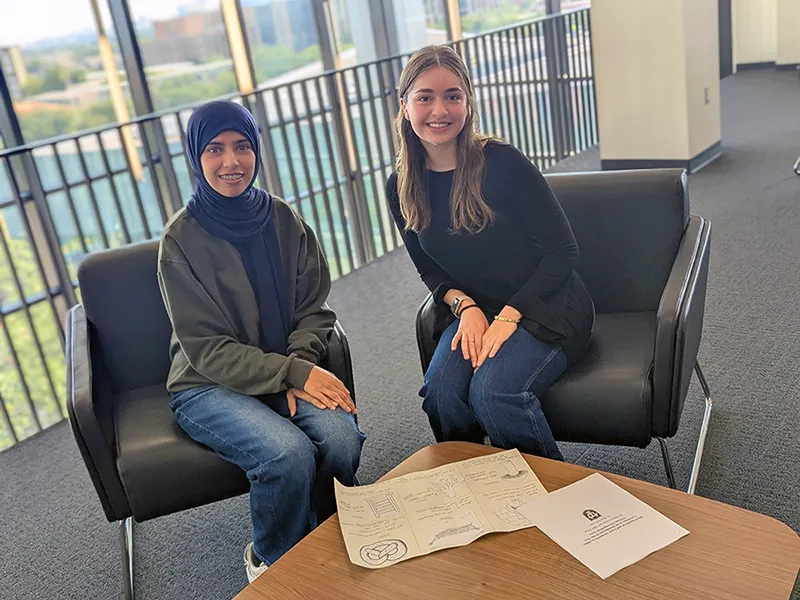
When Maya Zeitoun and Adan Abbas met in an Elementary Arabic class in Fall 2023, they never expected their connection would kickstart their research on cultural deficiencies in cognitive assessment tools for dementia. With the help of their mentor and professor Bouchaib Gadir, senior professor of practice for Middle East and North African Studies, the two pre-medical students outlined their research objectives and applied for funding from the Tulane Center for Engaged Learning and Teaching Faculty-Mentored Undergraduate Research Grant this past summer. After making it through the application process, they received the notification that they were awarded a grant to begin their work on tailoring the cognitive assessment tool, the Boston Naming Test (BNT), to better accommodate the cultural identity of older Levantine Arab immigrant adults in the New Orleans metropolitan area.
“Adan and Maya’s project bridges STEM and the liberal arts by combining neuropsychological testing with cultural analysis,” says Professor Gadir. “What makes their work particularly compelling is the interdisciplinary collaboration between two students from distinct academic backgrounds — Adan, a Cell and Molecular Biology major, and Maya, a Middle East and North African Studies major.”
The BNT is a widely used neuropsychological evaluation for assessing confrontation naming, or the capacity to name items in photographs. It is significant in dementia diagnosis since naming difficulties can indicate language deficits or cognitive decline. When administered, the BNT shows individuals 60 black-and-white photographs varying from common to rare items. Participants are asked to name each item within a time limit using either semantic or phonemic clues. The scores assist physicians in identifying naming problems that may suggest dementia, aphasia, or brain injury. But the test caters to English-speaking American adults by assuming familiarity with the pictures presented: test objects such as "pretzel" or "igloo," for example, are frequently unrecognized in Arab culture, resulting in errors that may not signify cognitive decline but simply unfamiliarity. These barriers might cause delays or distortions in diagnosis and treatment, restricting access to early treatments and support.
Maya Zeitoun’s focus on this research began after her Syrian grandmother, who lived in the United States, began to show early signs of dementia, though limited culturally appropriate resources caused uncertainty for an accurate diagnosis. “This research can bridge my passion for healthcare with my cultural background, while also supporting Arab communities, such as my grandmother, with reliable tools in detecting dementia,” Maya states.
Adan Abbas’s path to this topic was fueled by a connection to medicine and a strong desire to reduce healthcare barriers for minority communities. Adan shares, "As someone who is studying sociology and public health, I was drawn to this project after learning that language barriers can highly impact human development in a community." Her motivation strives to improve the lives of marginalized populations and uphold cultural identities in healthcare.
Linguistic issues such as diglossia (the employment of both Modern Standard Arabic and other dialects) can also impede the test's efficiency, causing further confusion. Furthermore, since the standard BNT only allows one correct answer, it may misinterpret multiple dialects as wrong. “These cultural and linguistic disparities can result in errors that do not reflect actual cognitive decline but rather differences in cultural exposure and language use,” Adan states. “By assessing the BNT to adapt to the differences in linguistics in Levantine dialects, dementia can be accurately detected with the support of culturally informed healthcare,” Maya continues. By adapting the BNT to cater to immigrants originating from the Levantine region, accurate results could be provided in detecting early signs of dementia throughout the New Orleans area.
“Our approach differs from the standard BNT by focusing on a patient’s socio-cultural context, as their answers can vary based on dialect, environmental factors, and cultural backgrounds,” Maya explains. “Compared to the BNT’s strict scoring system, we aim to provide a more flexible scoring system valuing culturally or linguistically relevant responses,” states Adan. These factors can improve accuracy for the Levantine Arab immigrants in dementia detection by incorporating meaningful cognitive differences and potentially pave the way for assessing other diverse populations — intertwining their fields to open new doors toward a culturally competent future in healthcare.

